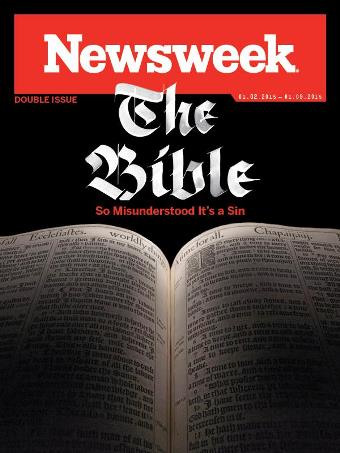COMPELLING TRUTH
Eichenwald, Newsweek, the Bible, and the Wrong Target
By Robin Schumacher

Single Page/Printer Friendly
Continued from Page One

Intellectual Advancement
Scientist Steven Weinberg once stated: "The world needs to wake up from the long nightmare of religion...Anything we scientists can do to weaken the hold of religion should be done, and may in fact be our greatest contribution to civilization."
Eichenwald more than hints at this in his article: getting rid of religion would supposedly open the floodgates of intellectual advancement. At least two things are worth mentioning about this faulty assertion.
First, while events like the often misunderstood Galileo episode happened, such things don't eclipse the fact that there have been legions of intellectually-gifted religious scientists who have delivered world-impacting accomplishments. One can ask, for example, how Francis Collins' belief in God held him back from his groundbreaking scientific work on DNA?
Second, we can easily turn the issue around and ask if an atheistic scientist's bias keeps him/her from accurately pursuing scientific truth. We listen to Richard Dawkins say, "Biology is the study of complicated things that give the appearance of having been designed for a purpose", and hear Francis Crick remind his listeners, "Biologists must constantly keep in mind that what they see was not designed, but rather evolved." (Emphases mine.)
Or maybe these biological organisms look designed because they are designed? Why rule out that possibility?
To listen to some of these atheistic scientists talk, it's not because of evidence. For example, George Klein admits: "I am an atheist. My attitude is not based on science, but rather on faith... The absence of a Creator, the non-existence of God is my childhood faith, my adult belief, unshakable and holy."
Such admissions and the unwillingness of atheistic scientists to allow for the possibility of a Creator lead other scientists like Dean Kenyon to speak out and say: "If science is based on experience, then science tells us that the message encoded in DNA must have originated from an intelligent cause. What kind of intelligent agent was it? On its own, science cannot answer this question; it must leave it to religion and philosophy. But that should not prevent science from acknowledging evidences for an intelligent cause origin wherever they may exist."
Human Harmony
Skeptics like Eichenwald never seem to grow tired of caricaturing Christians after the Westboro Baptist church-goer. If only the world could be rid of such hate-speech filled and condemning people, humanity could live more harmoniously and be better off.
It's tempting to say such thinking is not Eichenwald's fault because the media goes out of its way to highlight the extreme side of most things, while not giving airtime to items that don't help its ratings such as the countless Christian-founded shelters that assist people day in and day out. But I don't think Eichenwald deserves a pass here as he's supposed to be a journalist and know better.
In short, just a quick read through Alvin Schmidt's How Christianity Changed the World should silence any skeptic who wants to paint Christ followers as Westboro types that hate non-Christians, are demeaning to women, and don't love their neighbor. Of course exceptions do exist, but as Augustine wisely said, one should not judge a philosophy by its abuse.
Make no mistake, Christians can and will (and have the right to) speak out on cultural issues like abortion that are serious matters. Doing so in truth and love is not hate speech, although opponents of Christianity will always paint it that way — something the Apostle Paul noted when he wrote, "So have I become your enemy by telling you the truth?" (Gal. 4:16).
The Wrong Target
In his article, Eichenwald says that, "This examination is not an attack on the Bible or Christianity", but his shotgun-styled approach and rebirthing of so many historically failed attacks on the Bible says differently and thus in my opinion is disingenuous. It's both sad and funny that Eichenwald misinterprets and misapplies what the Bible says countless times in his piece, yet he passionately tells us the world would be much better off if only the Scriptures were properly interpreted.
In the end, Eichenwald's attempt at undercutting the authority of the Bible follows the same failed path of many who have preceded him. Moreover, his thinking of improving the world by gutting Christianity is every bit as flawed.
I wonder what we can expect from Newsweak this Easter?
Tags: Controversial-Issues | Current-Issues | False-Teaching | Reviews-Critiques
comments powered by Disqus
Published 1-7-15

